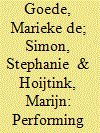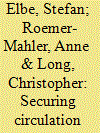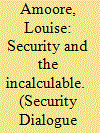|
|
|
Sort Order |
|
|
|
Items / Page
|
|
|
|
|
|
|
| Srl | Item |
| 1 |
ID:
134475


|
|
|
|
|
| Summary/Abstract |
In recent years, the European Union has supported the development of a new civil security market, capable of providing security technology for new and global security challenges. This article analyses the emerging growth market for civil security in relation to contemporary notions of potential crisis and emergency. Building on ongoing academic analysis of what Melinda Cooper has termed ‘economies of emergence’, the article points out how the figure of emergence generates investment in more flexible, adaptive and, so it is argued, potentially lucrative markets for civil security. Drawing on observations at a number of security trade shows and stakeholder workshops, the analysis demonstrates that ‘civil’ aspirations, concepts and technologies build on earlier formulations of military strategic discourse in the so-called Revolution in Military Affairs – though in complex and sometimes contradictory ways. More generally, the motivation behind the analysis is to investigate civil security and civil markets as performative enactments, and so to critically engage with the emergence of the civil security market as a priority in EU policymaking.
|
|
|
|
|
|
|
|
|
|
|
|
|
|
|
|
| 2 |
ID:
134476


|
|
|
|
|
| Summary/Abstract |
When it comes to anticipating terrorism, do recent technological advancements fundamentally change the modus operandi of intelligence services? Recent scholarship has focused on the new modes of reasoning brought about by ‘hi-tech’ forms analysis such as data mining, graph visualization and the algorithmic treatment of big data. While this article recognizes the increasing influence of these techniques, it argues they should not overshadow much more low-tech modalities through which a large part of counterterrorism work takes place. Low-tech counter-terrorism, based on qualitative methods and conjectural reasoning, still matters. Drawing on the case of French domestic intelligence services and based on qualitative interviews, observations and declassified documents, this article shows that the practices of security professionals, rooted in traditional institutional habituses developed over time, are largely in continuity with previous ‘low-tech’ forms of police work. In a context in which the uses of digital security technologies have generated discussions about politics and ethics, this article suggests that traditional techniques of intelligence gathering and processing therefore still merit a great amount of attention.
|
|
|
|
|
|
|
|
|
|
|
|
|
|
|
|
| 3 |
ID:
134477


|
|
|
|
|
| Summary/Abstract |
This article argues that with increasingly large databases and computational power, profiling as a key part of security governance is experiencing major changes. Targeting mobile populations in order to enact security via controlling and sifting the good from the bad, profiling techniques accumulate and process personal data. However, as advanced algorithmic analytics enable authorities to make sense of unprecedented amounts of information and derive patterns in a data-driven fashion, the procedures that bring risk into being increasingly differ from those of traditional profiling. While several scholars have dealt with the consequences of black-boxed and invisible algorithmic analytics in terms of privacy and data protection, this article engages the effects of knowledge-generating algorithms on anti-discriminatory safeguards. Using the European-level efforts for the establishment of a Passenger Name Record (PNR) system as an example, and on the theoretical level connecting distinct modes of profiling with Foucauldian thought on governing, the article finds that with pattern-based categorizations in data-driven profiling, safeguards such as the Charter of Fundamental Rights of the European Union or the EU data-protection framework essentially lose their applicability, leading to a diminishing role of the tools of the anti-discrimination framework.
|
|
|
|
|
|
|
|
|
|
|
|
|
|
|
|
| 4 |
ID:
134472


|
|
|
|
|
| Summary/Abstract |
Nearly 15 years after 9/11, it is time to grapple with the way in which imperatives of preemption have made their way into routine security practice and bureaucratic operations. As a growing literature in security studies and political geography has argued, preparing for catastrophe, expecting the worst, and scripting disasters are central elements of contemporary, speculative security culture. One of the most-discussed findings of the 9/11 Commission Report was that US security services had insufficiently deployed their imagination to foresee and preempt the attacks. This article introduces a special issue that offers a range of in-depth empirical studies that analyse how the imperative of ‘routinizing the imagination’ plays out in practice across different policy domains. It deploys the lens of performativity in order to conceptualize and explain the materialization of preemption and its situated entanglements with pre-existing security bureaucracies. We detail the idealized traits of a ‘security of the interstice’, which include interoperability, emergence, flexibility and analytical foresight that are meant to bridge the perceived gaps of security spaces and the temporal bridges between present and possible futures. The lofty rhetoric of preparing for the worst and bridging the gaps encounters numerous obstacles, challenges and reversals in practice. As becomes clear through the notion of performativity, such obstacles and challenges do not just ‘stand in the way’ of implementation, but actively shape the materialization of preemption in different sectors.
|
|
|
|
|
|
|
|
|
|
|
|
|
|
|
|
| 5 |
ID:
134474


|
|
|
|
|
| Summary/Abstract |
Governments in Europe and around the world amassed vast pharmaceutical stockpiles in anticipation of a potentially catastrophic influenza pandemic. Yet the comparatively ‘mild’ course of the 2009 H1N1 pandemic provoked considerable public controversy around those stockpiles, leading to questions about their cost–benefit profile and the commercial interests allegedly shaping their creation, as well as around their scientific evidence base. So, how did governments come to view pharmaceutical stockpiling as such an indispensable element of pandemic preparedness planning? What are the underlying security rationalities that rapidly rendered antivirals such a desirable option for government planners? Drawing upon an in-depth reading of Foucault’s notion of a ‘crisis of circulation’, this article argues that the rise of pharmaceutical stockpiling across Europe is integral to a governmental rationality of political rule that continuously seeks to anticipate myriad circulatory threats to the welfare of populations – including to their overall levels of health. Novel antiviral medications such as Tamiflu are such an attractive policy option because they could enable governments to rapidly modulate dangerous levels of (viral) circulation during a pandemic, albeit without disrupting all the other circulatory systems crucial for maintaining population welfare. Antiviral stockpiles, in other words, promise nothing less than a pharmaceutical securing of circulation itself.
|
|
|
|
|
|
|
|
|
|
|
|
|
|
|
|
| 6 |
ID:
134473


|
|
|
|
|
| Summary/Abstract |
In this article, I explore a specific relation between mathematics and security calculations. Recalling the confrontations between the mathematician Alan Turing and the philosopher Ludwig Wittgenstein in the 1930s, I am interested in the relationship between intuition and ingenuity. During Wittgenstein’s 1930 lectures on the foundations of mathematics, Turing interjects in order to insist upon the capacity of number: ‘one can make predictions’. Wittgenstein replies that mathematics ‘makes no predictions’, but instead is a form of grammar: ‘taken by itself we shouldn’t know what to do with it; it’s useless. But there is all kind of use for it as part of a calculus’. It is just such a formulation of a calculus or grammar – ‘decision trees’, ‘event trees’, ‘attribute-based algorithms’ – that characterizes contemporary security. As for Turing, the logic comprises ‘two faculties, which we may call intuition and ingenuity’. The intuitive realm of imagination and speculation reaches toward a possible solution, while the ingenuity seeks arrangements of propositions. The advent of ‘rules-based’ and ‘risk-based’ security decisions, then, are always already political because they precisely involve combinatorial possibilities whose arrangement has effects in the world.
|
|
|
|
|
|
|
|
|
|
|
|
|
|
|
|
|
|
|
|
|